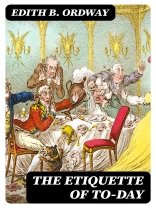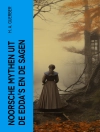In ‘The Etiquette of To-day, ‘ Edith B. Ordway presents a comprehensive exploration of social customs and decorum pertinent to the early 20th century. Through a blend of analytical discourse and practical guidance, Ordway deftly navigates the complexities of social interactions across different contexts, from formal gatherings to casual encounters. Her sophisticated prose, infused with wit and clarity, reflects the evolving nature of etiquette amid the changing societal norms of her era, highlighting the interplay between tradition and modernity. Edith B. Ordway, an astute observer of social dynamics, draws upon her extensive experience in high society and her commitment to fostering civility and grace in interpersonal relations. Her insights are deeply rooted in the cultural discourse of her time, which was marked by rapid social change and the emergence of new lines of class distinction. Ordway’s cultural background likely fueled her desire to articulate a guide that not only reflects the etiquette of her own experiences but also serves as a teaching tool for those striving to navigate the complexities of social life. Recommended for scholars, historians, and anyone interested in the cultural nuances of past social practices, ‘The Etiquette of To-day’ is an indispensable resource. It not only provides historical context but also challenges readers to reflect on their own social behaviors in contemporary settings, making it a timeless examination of etiquette that resonates with today’s ongoing conversation about civility.
Over de auteur
Edith B. Ordway remains a somewhat enigmatic figure in the sphere of etiquette and social behavior literature, primarily recognized for her work ‘The Etiquette of To-day, ‘ first published in the early 20th century. While biographical details about Ordway are sparse, her contribution to the genre of etiquette books is notable. ‘The Etiquette of To-day’ serves as a comprehensive guide, reflecting the social customs and expectations of her time. Ordway’s detailed exposition offers insights into the manners deemed essential for various social situations, ranging from correspondence and conversation to social engagements and dress. Her work encapsulates the etiquettes that governed the everyday interactions and societal norms of the period. The book addresses both men and women, emphasizing the importance of polite society and the role of proper behavior in maintaining one’s reputation and social standing. Although ‘The Etiquette of To-day’ is edifying for historical understanding, the lack of additional publications or biographical information casts Ordway as a somewhat singular figure in literary circles focused on social conduct. Nonetheless, her contribution to the field remains a touchstone for those interested in the customs and decorum of the past.












